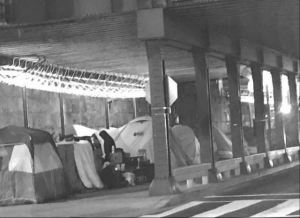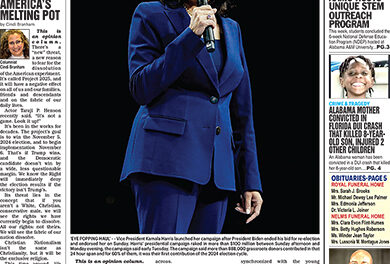
City leadership clearing out the encampments in the NoMa neighborhood used for unhoused residents is just one of the many challenges in the District’s housing crisis. (Photo by Micha Green (AFRO Archives 2020)
By Micha Green
AFRO D.C. and Digital Content Editor
mgreen@afro.com
The District of Columbia’s housing crisis- homelessness, evictions, foreclosures, a lack of affordable residences and money mismanagement- has reached the point where everybody is talking about it- from the streets, to the tweets, to the D.C. Council seats.
Homelessness.
In early January 2020, the City posted signs announcing that the tents and belongings of those in the encampments on K and L Streets N.E. in the NOMA neighborhood (or for native Washingtonians, the New York Avenue area) had to be cleared. Many pushed back on this announcement, asking where would these already displaced residents go? Two months later, the pandemic hit the D.C. area hard, creating a distraction from the displacement of the encampment residents- particularly considering CDC guidances.
“In the context of COVID-19 spread and transmission, the risks associated with sleeping outdoors or in an encampment setting are different staying indoors in a congregate setting such as an emergency shelter or other congregate living facility. Outdoor settings may allow people to increase physical distance between themselves and others,” according to the CDC, which goes on to emphasize that addressing homelessness should still be a priority. “However, sleeping outdoors often does not provide protection from the environment, adequate access to hygiene and sanitation facilities, or connection to services and healthcare. The balance of risks should be considered for each individual experiencing unsheltered homelessness.”
However, now the District is actively removing the encampments, which is outraging leaders and advocates across the area.
Bulldozers took to the sidewalks of K and L Streets N.E. this week, where the encampment had been, and one man was still in his tent as it rolled through, injuring him.
“It shouldn’t take D.C. bulldozing somebody to get you to realize that clearing homeless encampments is a bad idea. But, if it did, welcome,” tweeted self-described “Jewish justice seeker,” Jesse Rabinowitz, who regularly advocates for D.C.’s marginalized communities. “They tried to bulldoze his tent. They tried to throw him away. Let that sink in.”
Rabinowitz also noted that the encampment clearing does not follow the guidances from the CDC.
“Strange that uses CDC guidance as the reason why schools must focus on in-person learning at the same time ignoring CDC guidance that says homeless encampments shouldn’t be cleared during COVID. I guess we only listen to science if it allows us to do what we want,” Rabinowitz tweeted.
Harriet’s Dream co-founder and organizer, NeeNee Tay took to Instagram to call out Mayor Bowser and the City’s leadership for how the encampment clearing was handled.
“Today was hurtful and harmful to the encampment community a waste of tax dollars. The chose property and gentrification over people,” Tay wrote.
“Our response to homelessness should be housing, not encampment clearings and violence. These evictions of our unhoused neighbors never should have happened and should be immediately paused until every resident is fully and permanently housed,” the Ward 4 Council member tweeted.
Evictions.
When the COVID-19 pandemic hit, bills were hard to pay and many residents found it challenging to keep up with housing payments. The District of Columbia Council worked to get an eviction moratorium, through the Coronavirus Omnibus Emergency Amendment Act of 2020.
While the federal moratorium expires in February 2022, the District has begun to phase out aspects of the moratorium, allowing for landlords to file for eviction October 12, and according to an AFRO at least 300 evictions are scheduled to take place through October 2021.
Foreclosures.
According to Council member Janeese Lewis George, (D- Ward 4), nearly 7,000 District homeowners are behind on mortgage or housing payments and almost 95 percent of those residents are Black or Brown. The foreclosure moratorium was set to end in November, however, George created an amendment to extend it, and on Oct. 5, she announced the extension was approved. The moratorium is now extended until February 4, 2022.
“Thanks to my colleagues for their support and to advocates for calling attention to this,” Council member Lewis George tweeted in celebration of the approved amendment. “Now let’s focus on distributing federal foreclosure prevention aid to people who need it.”
Money mismanagement.
According to a report from the Office of the Inspector General, the District misused almost $82 million in funds that were supposed to be allocated for affordable housing. This comes amid a major affordable housing crisis and showed mismanagement of projects from the Housing Production Trust Fund and money used to pay back debt.
“Here’s what’s going on: the law requires DC to spend 50 percent of its housing funds to create homes that are affordable for people making 30 percent the median income or less (that’s $38,7000 for a family of 4) But DC’s housing agency has failed to do that year after year with no consequence,” Council member Lewis George posted on Instagram.
“This report on the city’s mismanagement of affordable housing funds is damning. DC failed to prioritize deeply affordable housing for the families that need it most (as required by law) and let developers overcharge rent, underdeliver affordable units, and fail to pay back loans,” the Ward 4 Council member added.
However, a spokesman, Richard Livingstone, wrote, “This report ignores tremendous success of the Housing Production Trust Fund,” according to the Washington Post. “We know we have more work to do, and together we will continue to deliver unprecedented numbers of affordable units for our residents.”
The Ward 4 Council member and other activists are pushing back on the deflection from the money mismanagement.
“Don’t let the jargon keep you from paying attention. This matters! Each failure here contributed to displacement in our communities and the skyrocketing cost of housing. There were so many missed opportunities to create affordable homes for neighbors who were instead pushed out,” she said.
Help us Continue to tell OUR Story and join the AFRO family as a member – subscribers are now members! Join here!
The post Housing help, crisis, scandal all in one week appeared first on AFRO American Newspapers .











